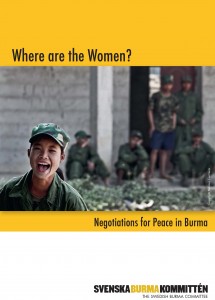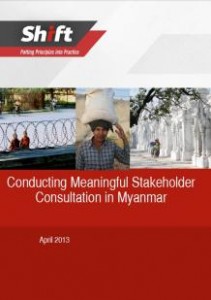Resources (827 found)
Explanation About Article 401 of the Criminal Code of Procedure
401.(1) When any person has been sentenced to punishment for an offence, the President of the Union may at any time, without conditions or upon any conditions which the person sentenced accepts, suspend the execution of his sentence or remit the whole or any part of the punishment to which he has been sentenced […]
• • •Update of Human Right Violations by the Burma Army During Offensives in Palaung Areas (March and April 2013)
Since January 2013, Burmese government troops have been carrying out military offensives in Palaung areas against the Shan State Army-North (SSA-N), Kachin Independence Army (KIA) and Ta’ang National Liberation Army (TNLA). The Burmese troops have committed widespread human rights violations during these operations […]
• • •Gains Need Consolidation in Landmark Year for Change in Burma
This report summarizes the current state of press freedom and freedom of expression in Burma, as a part of SEAPA’s report “Southeast Asia Press Freedom Challenges for 2013.” It examines the expanding space for media in the country, increasing journalist solidarity and the turbulent transition that still lays ahead, especially when it comes to divisive issues such as violence against Muslims. In summary, the reforms have not yet been institutionalized and the government still seems bent to retain control of the press and right to freedom of opinion and expression […]
• • •Where Are the Women? Negotiations for Peace in Burma
 Women in Burma are effectively excluded from participating in the negotiations for peace. Less than a handful of women have been part of the official talks held between the State and the armed groups, and none of the 12 preliminary ceasefire agreements reviewed for this report includes any references to gender or women. The expertise of local women’s groups in peacemaking and trust building efforts has gone unnoticed, and concerns raised by women are being sidelined. The interest by the dominant funders of the Burmese peace building initiatives, the international community, in advocating for the increased participation of women or for the mainstreaming of gender responsiveness has been, at best, inadequate. This is a worrisome development which requires action from both international and local actors as the continued exclusion of women risks undermining the legitimacy of the entire process […]
Women in Burma are effectively excluded from participating in the negotiations for peace. Less than a handful of women have been part of the official talks held between the State and the armed groups, and none of the 12 preliminary ceasefire agreements reviewed for this report includes any references to gender or women. The expertise of local women’s groups in peacemaking and trust building efforts has gone unnoticed, and concerns raised by women are being sidelined. The interest by the dominant funders of the Burmese peace building initiatives, the international community, in advocating for the increased participation of women or for the mainstreaming of gender responsiveness has been, at best, inadequate. This is a worrisome development which requires action from both international and local actors as the continued exclusion of women risks undermining the legitimacy of the entire process […]
Conducting Meaningful Stakeholder Consultation in Myanmar
 Shift’s April 2013 report is designed to assist companies with the challenge of conducting meaningful consultations with stakeholders, as they consider or commence operations in Myanmar. The report (1) provides a survey of stakeholder views regarding the entry of companies into Myanmar; and (2) sets out key elements for companies to consider in their stakeholder engagement strategies […]
Shift’s April 2013 report is designed to assist companies with the challenge of conducting meaningful consultations with stakeholders, as they consider or commence operations in Myanmar. The report (1) provides a survey of stakeholder views regarding the entry of companies into Myanmar; and (2) sets out key elements for companies to consider in their stakeholder engagement strategies […]
Burma: Visit report
 Burma today is on a knife-edge of hope and fear. For the first time in more than two decades, there are real reasons for cautious optimism about the prospects of freedom and democracy in Burma. Over the past eighteen months, significant reforms have been introduced by President Thein Sein which have resulted in the release of the majority of political prisoners, the election of Daw Aung San Suu Kyi and 42 of her colleagues in the National League for Democracy (NLD) to Parliament, significantly increased freedom for the media, civil society and political actors, and improvements in freedom of expression. The agreement of preliminary […]
Burma today is on a knife-edge of hope and fear. For the first time in more than two decades, there are real reasons for cautious optimism about the prospects of freedom and democracy in Burma. Over the past eighteen months, significant reforms have been introduced by President Thein Sein which have resulted in the release of the majority of political prisoners, the election of Daw Aung San Suu Kyi and 42 of her colleagues in the National League for Democracy (NLD) to Parliament, significantly increased freedom for the media, civil society and political actors, and improvements in freedom of expression. The agreement of preliminary […]
Executive Summary and Recommendations of the Final Report
The Inquiry Commission on the Sectarian Violence in Rakhine State submitted it’s final report to President Thein Sein on 22 April. Read the executive summary and recommendations from the report here.
• • •Country Reports on Human Rights Practices for 2012, Burma
Burma’s parliamentary government is headed by President Thein Sein. On April 1, the country held largely transparent and inclusive by-elections in which the National League for Democracy (NLD) party, chaired by Aung San Suu Kyi, won 43 of 45 contested […]
• • •The 2012 Foreign & Commonwealth Office Report – Burma
The political and economic reforms that began in 2011 continued during 2012 under President Thein Sein. The UK Government’s approach is one of cautious engagement, welcoming and encouraging reform while paying close attention to the human rights situation […]
• • •“All You Can Do is Pray”: Crimes Against Humanity and Ethnic Cleansing of Rohingya Muslims in Burma’s Arakan State
Crimes Against Humanity and Ethnic Cleansing of Rohingya Muslims in Burma’s Arakan State
This 153-page report describes the role of the Burmese government and local authorities in the forcible displacement of more than 125,000 Rohingya and other Muslims and the ongoing humanitarian crisis […]
• • •








 All posts
All posts